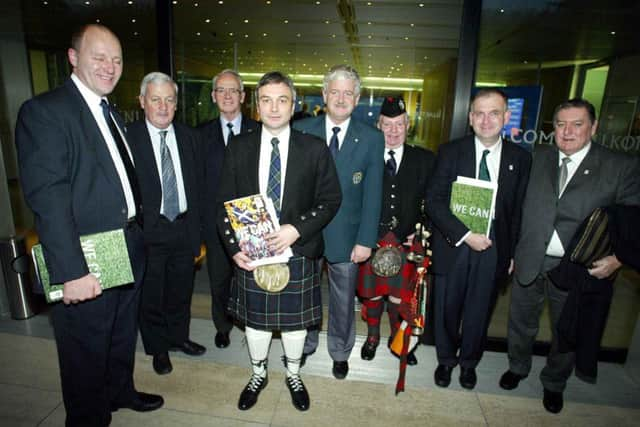Scotland’s Euro award fitting tribute to Taylor


The former SFA chief executive and general secretary of Uefa died in June this year at the age of 60.
A passionate and outspoken supporter of the campaign for Scottish independence, Taylor would have been disheartened by the outcome of the country’s referendum.
Advertisement
Hide AdAdvertisement
Hide AdBut, on the same day, another ballot in Geneva would certainly have elicited his approval as his beloved Hampden was chosen as one of the host cities for the European Championship Finals in 2020.
The staging of three group matches and one last-16 match at the stadium – with Scotland playing there if they qualify for the tournament – will fulfil an ambition which Taylor cherished but saw dashed back in December 2002.
That was when he led the joint Scottish-Irish bid to host Euro 2008. He arrived at the vote in Geneva resplendent in full Highland dress and full of genuine hope the bid would succeed. But, although members of Uefa’s executive committee on that occasion praised Taylor’s oratory in his presentation as the most passionate they heard, the Scottish-Irish candidacy was dismissed in the first round of voting due to technical and political weaknesses.
Taylor’s memory was warmly evoked by Uefa president Michel Platini, a close friend during his time at European football’s governing body, when yesterday’s announcement was made.
It may not be on the scale which Taylor envisaged with the joint bid for Euro 2008, but Glasgow’s success in securing four matches in the second most important tournament in world football should not be underestimated.
Hampden has hosted three European Cup/Champions League finals, two European Cup Winners’ Cup Finals and, most recently, the Europa League final in 2007. Despite its critics, it remains the spiritual home of Scottish football and one of the most famous venues in world football.
Its rich history will now have a new chapter, with Scottish fans able to witness elite major international finals action on their own doorstep. It will also provide an added incentive for Scotland, currently occupied with their attempt to reach the Euro 2016 finals in France, to ensure they are part of the main event in 2020.
The pan-European nature of the tournament is to mark its 60th anniversary and is the vision of Platini. Wembley will host the climax, with 12 other cities joining the party. The 90,000-seater Wembley, rebuilt from 2003 to 2007 and venue of the 2011 and 2013 Champions League finals, will stage both semi-finals and the final. It will be the first time in the competition’s history that a tournament has been hosted by more than two countries.
Advertisement
Hide AdAdvertisement
Hide AdWembley got the nod over Munich’s Allianz Arena, the other stadium initially bidding for semi-finals and final hosting rights before a late withdrawal. Munich had to make do with being one of 12 cities awarded one of the standard packages, comprising three group matches and a knockout round tie.
The home of Bayern Munich will host a quarter-final, along with the Baku Olympic Stadium in Azerbaijan, Rome’s Olympic Stadium and the Zenit Arena in St Petersburg, Russia. Azerbaijan, which separates Russia and Iran along the Caspian Sea, is spending sovereign wealth to project a softer image through sport.
The Uefa vote came a day after Azerbaijan’s human rights record was criticised by the European Parliament. Legislators called on the Azerbaijani authorities “to undertake long-overdue human rights reforms without further delay and cease their harassment of civil society organisations, opposition politicians and independent journalists and lift the ban of public gatherings in Baku”.
But Platini defended the choice of Baku, which is building a 69,870-capacity stadium set to open next year.
“If we started to look at all these problems we wouldn’t have football played throughout the world,” Platini said when asked about criticism of Azerbaijan. “We are involved with football. Football is football, politics is politics.”
As well as Glasgow, last-16 ties will take place in Copenhagen, Amsterdam, Bucharest, Dublin, Bilbao, Budapest and Brussels.
Cardiff’s Millennium Stadium along with bids from Stockholm, Skopje, Jerusalem, Sofia and Minsk were all rejected.
Dublin’s inclusion in the tournament coincides with the Football Association of Ireland’s 100th anniversary.
Advertisement
Hide AdAdvertisement
Hide Ad“This one-off opportunity to host part of the European finals at our home stadium will provide a major boost for Irish football and the country as a whole,” FAI chief John Delaney said in a statement.
There was relief too for Russia, given the current conflict near its border with Ukraine.
“I want to congratulate all supporters of Russian Football,” Russian Minister for Sport Vitaly Mutko said.
“Of course, there was a chance that, because of the current political situation, the powers would refuse to let us host matches at Euro 2020. But we are really happy that the world of sport and politics are kept separate.”
The choice of Rome’s Olympic Stadium for a quarter-final match follows on from Thursday’s Uefa announcement that Milan’s San Siro would be the venue for the 2016 Champions League final.
Football Federation president Carlo Tavecchio said it showed the country is making strides after years battling problems with hooliganism and crumbling stadia.
“From a sporting perspective, our intention is to consolidate the international dimension of Italian football, contribute to the renewal of our stadiums and support the growth of the football movement, in particular at grass roots level,” he said. No French cities will be used, although France is hosting the next finals in 2016.